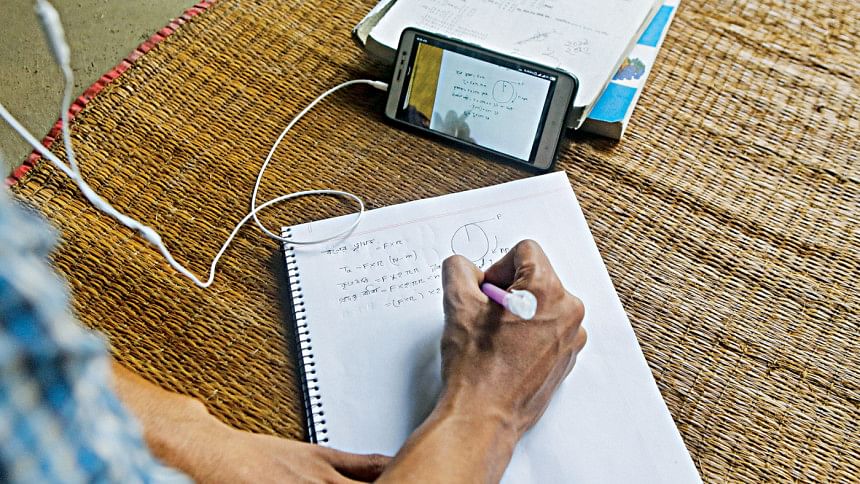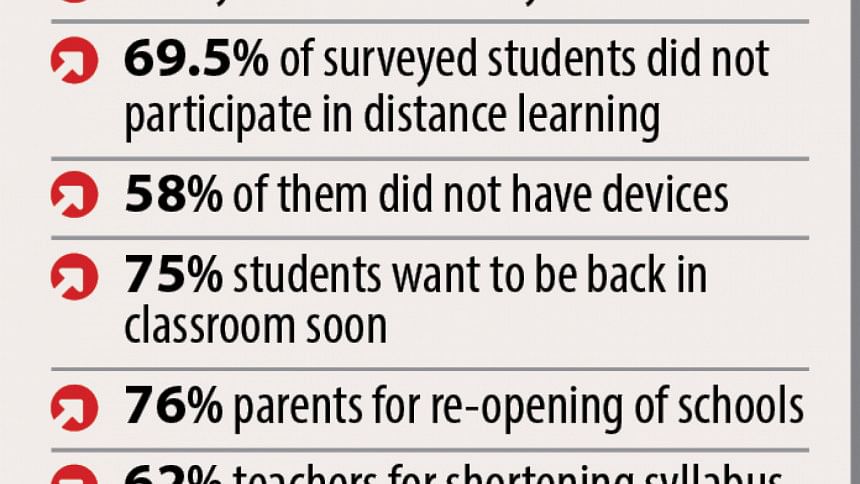Education During Pandemic: Digital divide wreaks damage

Distance learning programmes through television, radio and internet, adopted after the school closure due to Covid-19, remain by and large ineffective, finds a study.
The finding was mentioned in the interim Education Watch Report 2020-21 released virtually by Campaign for Popular Education (CAMPE) yesterday.
The researchers who carried out the study said the prolonged closure, since March last year, is resulting in growing monotony and boredom in millions of children who are confined to their home, away from their peers.
They interviewed 2,952 respondents, including 1,709 primary and secondary students, 578 teachers and 576 parents, picked from eight districts in eight divisions for the study. The interviews were taken over phone in the first and second weeks of last month.
According to the report, about 69.5 percent of the students did not participate in the distance learning and 57.9pc of them said they could not join the classes due to a lack of devices.
About 69 percent of the students in rural areas interviewed said they could not take part in the classes for not having devices, the report says.
On the other hand, 16.5pc of students interviewed said they did not find online classes "interesting" and that was why they skipped them.
"Distance learning programmes, by and large, remain ineffective. Students said they do not have TVs, laptops, computers and smartphones," Mostafizur Rahaman, one of the study team members, told The Daily Star after the report was launched yesterday.
Contacted for comments, Directorate of Secondary and Higher Education (DSHE) Director General Prof Syed Md Golam Faruk said the report had already been shared with government officials.
"The study was done during December, when secondary school students were solely focused on receiving and submitting assignments. So, the students' participation in distance learning was low [at that time]," he argued.

On March 17, the government closed all schools to contain the spread of coronavirus. The closure has recently been extended till January 30. The authorities have yet to decide when to reopen the educational institutions. The long closure has led to the cancellation of exams and left academic calendars in disarray.
After the school closure, the government started TV education through Sangsad TV for secondary and primary students. The school authorities are working to continue imparting lessons online.
Most students in urban areas have access to learning through the internet, but the digital divide has so far proved to be a great disadvantage for the underprivileged learners as they face the prospect of dropping out, mainly for the lack of devices and poor access to the internet.
While presenting the report yesterday, Mostafizur said students participating in distance learning spend, on an average, 50 minutes a day for receiving education.
Talking to this newspaper, teachers, however, said a student usually attends five to six online classes a day on average, meaning the daily learning time for them is around four hours.
DEMAND FOR REOPENING
The study report said 75 percent of students surveyed want to be back in the classroom soon and 76 percent parents, 73 percent district-level education officials and 80 percent education-related NGO officials are in favour of school reopening.
Fifty-eight percent of teachers favour reopening of schools following a more cautious approach.
The report said 82 percent teachers emphasised on the use of masks, sanitiser and the maintenance of social distancing for the reopening.
Fifty-three percent primary teachers and 48 percent secondary school teachers opined that the educational institutions must be cleaned and made safe before those are opened again.
About half of the teachers surveyed spoke in favour of changing sitting arrangements in classrooms so that physical distancing can be maintained.
Mostafizur Rahaman told The Daily Star that many parents were calling for reopening the schools, saying that their children were becoming restless due to almost no contact with their teachers and friends for such a long period.
"Many parents say all activities are being done in the usual way and ask us why will children have to stay home like this?" he said.
Convenor of the Education Watch Report 2020-21 Mushtaque Chowdhury said the schools should be reopened in phases.
"We should consider starting usual classes only where Covid-19 infection and date rates were less. We should then analyse the situation and go for the reopening in other places," he said.
The study also showed that 62 percent of teachers said the syllabus should be shortened to recover the academic losses caused by the pandemic. On the other hand, 45 percent of students proposed completion of lessons that were not taught due to the closure.
Twenty-five percent teachers and the same percentage of guardians feared that the school drop-out rate might go up due to the closure.
DSHE DG Golam Faruk, however, said he did not think the rate would increase significantly. "But we are aware about the matter."
He also said any decision on reopening schools would come from the high-ups of the government. "We're assessing how much academic loss has been incurred due to the closure, we will take necessary steps to recover it," he added.
RECOMMENDATIONS
The study recommended that schools should be reopened in line with the directives of the National Technical Advisory Committee on Covid-19.
Schools in rural areas where Covid-19 situation has not worsened should be reopened in February and schools in Dhaka, Chattogram, Khulna, Rajshahi and divisional cities could be reopened in phases in March.
The reopening should be done in phases, with classes of grades IV, V, X and XII initially and those of other grades later, the study suggested.
There should be steps to ensure that students and teachers wear masks, and they have clean toilets, classroom benches and arrangements for washing hands.
The study also recommended cutting down time for examinations and giving more time on imparting education. It recommended taking no Primary Education Completion Examination and Junior School Certificate tests, and shortening SSC and HSC syllabuses with fewer subjects.
Calling for cutting down vacation period in future, the study suggested vaccinating all teachers and other teaching staffers immediately.
"The government should make a decision on reopening schools soon. Parents, students and general people are in favour of school reopening. Whatever the decision is, it should be announced soon so that students and teachers can make necessary preparations," CAMPE Executive Director Rasheda K Choudhury said.
She also said funds would be required to ensure safety and hygiene of students and teachers, and that funds must be ensured on a priority basis.

 For all latest news, follow The Daily Star's Google News channel.
For all latest news, follow The Daily Star's Google News channel. 




Comments